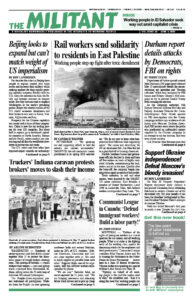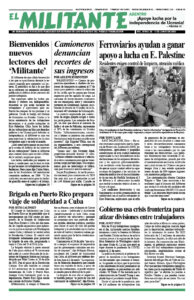Department of Justice special counsel John Durham’s 306-page report released May 15 meticulously details the unconstitutional spy operation and “Russian collusion” witch hunt instigated by FBI bosses and Hillary Clinton’s 2016 campaign to try to prevent Donald Trump from winning the election.
As the campaign unfolded, FBI Deputy Director Andrew McCabe and Deputy Assistant Director for Counterintelligence Peter Strzok opened an FBI investigation into the Trump campaign without any evidence of collusion with Moscow, Durham shows. And FBI leaders were aware the probe was predicated on unfounded rumors supplied by the Clinton campaign in an attempt to rig the election. But they went ahead anyway.
CIA Director John Brennan provided Durham with his notes of an Aug. 3, 2016, meeting with President Barack Obama, then-FBI boss James Comey and other officials. Brennan writes he briefed them about an “alleged approval by Hillary Clinton on July 26, 2016, of a proposal from one of her advisors to vilify Donald Trump by stirring up a scandal claiming interference by the Russian security services.”
After Trump took office, the FBI helped turn its operation into a two-year-long open-ended special counsel probe headed up by ex-FBI boss Robert Mueller. Its aim was to cripple the Trump presidency and cover up the FBI’s spying on him. At its conclusion, Mueller had to admit he “found no evidence that Trump’s campaign colluded with Russia.”
As Durham continued his investigation, Democrats decided to try to upstage him. Department of Justice Inspector General Michael Horowitz “investigated” the FBI’s conduct. He concluded in 2019 that no one involved was shown to “act out of political bias.” He especially singled out Strzok and Lisa Page, a special assistant to McCabe.
Durham shows this is a bald-faced lie. The two exchanged over 50,000 texts attacking Trump. And the FBI says it “lost” five months of their correspondence.
Page called Trump “a loathsome human.” Strzok called him a “disaster.” He said, “Hillary should win 100,000,000-0.” Later Strzok turned his venom on working people who would vote for Trump, saying they “will get what the voting public deserves.”
Democrats have tried to dismiss Durham’s report as old news and nothing to get excited about. The FBI said it had “already implemented dozens of corrective actions,” to prevent what Durham describes from happening again. Don’t worry, says current FBI boss Christopher Wray, those responsible for spying on Trump’s campaign have long since left the agency.
Strzok, who was fired by the FBI as it tried to cut its losses, claimed Durham’s report vindicated him!
US rulers seek to refurbish FBI image
Both Democrats and Republicans know the FBI’s standing has been damaged as decades of illegal spying and disruption were forced into the public eye. The targets were Black rights fighters, unionists, opponents of Washington’s wars and political groups, including the Socialist Workers Party.
The Democrats continue to use the political police agency to go after Trump and other political foes, telling their liberal and middle-class left base this shows the agency has changed its spots.
Republicans decry these attacks. A return to “the old” FBI is needed, Durham says, if the spy agency is to fulfill its mission statement to “Protect the American People and Uphold the Constitution.” He’s talking about the FBI of the 1950s and ’60s.
For working people there never were any good old days. Upholding constitutional protections is incompatible with the tasks of an intelligence agency whose job is the defense of capitalist rule.
Durham ends his report with a warning, quoting former Attorney General Edward Levi in 1977. “Nothing can more weaken the quality of life,” Levi said, “than our failure to make clear by words and deed that our law is not an instrument of partisan purpose.”
Levi was tasked with resurrecting the FBI’s reputation after revelations of the Richard Nixon administration’s Watergate scandal, including wiretapping and burglary against its rivals in capitalist politics.
As part of his cleanup attempt, Levi also announced the FBI was terminating its Cointelpro program of spying and disruption against the SWP. This came three years after the party launched a political and legal campaign to force out the facts and extent of FBI attacks on the SWP and others. This included the FBI file on Fred Halstead, a longtime leader of the SWP and its presidential candidate in 1968.
“Twenty-nine years it covers,” Halstead told a meeting of 300 people in New York in 1976. “This is just 533 pages of how they followed me around every place I went. And to every job I had. And every apartment I lived at. And they spoke to my employers, and my landlords, and the business agents in my union, and even to people I interviewed when I wrote articles for the Militant.”
“If they can do this to me they can do it to anyone,” he said. The FBI was forced to admit it had collected 10 million pages of files on the SWP.
Levi’s effort to resurrect the reputation of the FBI failed. The 15-year-long political battle by the SWP won the support of thousands. It resulted in a federal court ruling in 1986 that broke new ground. For the first time a court ruled that the use of the FBI or other cop informers to spy on individuals, including SWP members and other working-class militants, violates freedom of association; that burglaries to steal papers or plant microphones violate the Fourth Amendment; that the covert disruption of the party’s activity and the lives of party members described at length in Judge Thomas Griesa’s ruling are illegal.
“The party’s campaign and the victory won for the SWP,” says the political resolution adopted by the party in December, “helped keep political space open for all working people to speak, organize, and act … wherever the exploited and oppressed classes are thinking politically, discussing and fighting back.” It’s printed in The Low Point of Labor Resistance Is Behind Us: The Socialist Workers Party Looks Forward.

